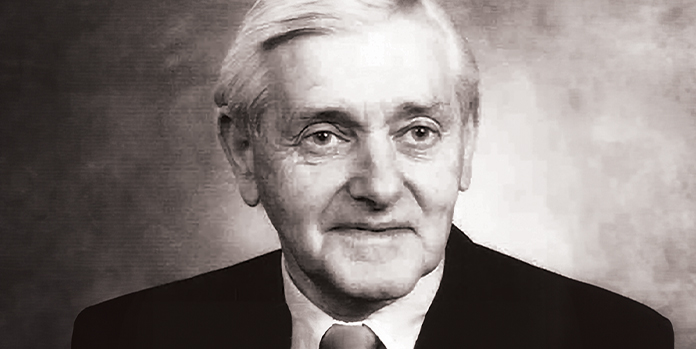
Gordon Trinca AO OBE (OM 1939)
Described as a person who “pricked the conscience of politicians”, road trauma prevention and treatment pioneer Gordon Trinca AO OBE (OM 1939) played a key role in the safety measures that continue to save lives on our roads today.
Alongside Melbourne Police Surgeon John Birrell ISO OAM (OM 1941), Gordon worked to introduce safety measures we take for granted, including compulsory seatbelts, random breath testing, and a blood alcohol limit of 0.5.
A surgeon willing to ask the hard questions
A natural leader, in his final year at Melbourne Grammar School Gordon served as Captain of the School, Captain of Morris House, Captain of the First XI cricket team, a member of the First XVIII football team and involved in many other School activities. He went on to serve on the Old Melburnians Council from 1940 to 1944.
Known as an honourable, forgiving and altruistic person, Gordon began his medical career as a GP in 1946, and was admitted as a Fellow of the Royal Australasian College of Surgeons in 1958 before becoming the Senior Consulting Surgeon at Preston and Northcote Community Hospital. It was there that he quickly became “fed up with stitching up” road accident victims from even the smallest of crashes – a reality he knew was preventable, so he set about doing something about it.
Aware that the state government had little interest in road safety reform at the time, in the 1960s Gordon began collecting statistics which he would later use to support his case for change. They revealed the difference immediate specialist medical care could make so his focus extended beyond preventative measures. Gordon was one of the first to espouse the view that the prevention of trauma required a threefold approach: prevent the crash, prevent injury in the crash, and prevent injury aggravation after the crash.
“Dad knew he needed to improve the situation, not just keep dealing with it as it was,” says son Stephen Trinca (OM 1968). “His holistic perspective meant he was focused not just on prevention, but also on the care people received in the ambulance and in the emergency room.”
He began spending long hours at hospital during peak accident periods. Leading by example, he gradually embedded the practice of surgeons remaining on site, rather than on call, ready to make the all-important first assessment of crash victims.
Later, Gordon would go on to play in influential role in the establishment of Victoria’s Mobile Intensive Care Ambulance (MICA) service in 1971 – one of three in the world at that time.
The long road to political consensus
Already recognised as a “dominant force” in road safety advocacy, Gordon was appointed Chair of the highly respected Royal Australasian College of Surgeons’ Road Trauma Committee from 1975 until 1993. Over almost 20 years, he successfully used that position as a platform from which to further influence decision makers and politicians, as well as ‘educate’ the general public about changes that were needed to help save their lives.
Gordon’s influence extended well beyond Victoria being internationally recognised for his pioneering work on road trauma. He was elected Vice President of the International Association for Accident and Traffic Medicine in 1975. He also served as both a member of and consultant to the World Health Organization's Expert Advisory Panel on Accident Prevention.
In 1985 he established the Global Traffic Safety Trust—an international group informally known as “Trinca’s Thinkers” committed to the same cause. Alongside advocacy , their work extended Gordon’s existing fine body of academic papers and, as a consequence, they received the prestigious 1988 international Volvo Traffic Safety Prize.
“Whatever he put his mind to, he would see it through,” says Stephen. “He was always willing to embrace what he took on wholeheartedly, and never walked away when things got hard.”
Trinca had been practicing medicine for many years before he saw Victoria introduce significant change. Legislation limiting drivers’ blood alcohol limit to 0.05 came about in 1966. Random breath testing was legislated in 1976 in Victoria. Then, in 1970, legislation for the mandatory wearing of seat belts was introduced in Victoria – the first jurisdiction in the world to do this.
Cherishing people beyond medical care
Gordon's deep-rooted concern for humanity was not restricted to road safety. No matter how busy he became with his enormous level of commitments, Trinca never missed out on attending the annual Lord Somers Camps for disadvantaged youth which he first attended in a service role as a Melbourne Grammar student and, later, where he served as President and Camp Chief for several years.
In 1979, Trinca was honoured as an Officer of the Order of the British Empire for services to road safety, and he became an Officer of the Order of Australia in 1991 for his services to both road safety and the treatment of road accident casualties.
Through his tireless work as a surgeon and road safety advocate, Gordon Trinca created change by shining the spotlight on issues many wanted to ignore, to the betterment of all of us.
